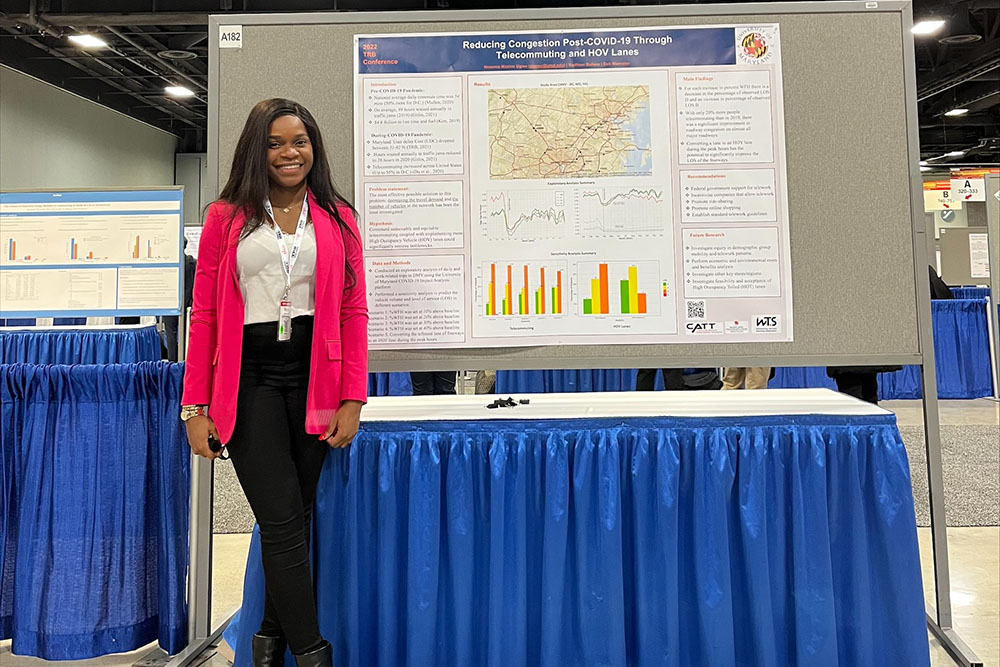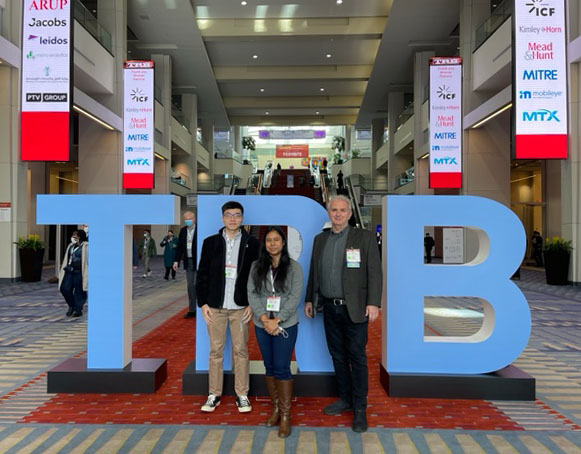News Story
New Research Showcased at TRB

UMD doctoral student Nneoma Ugwu was part of a research team that examined the effects of telecommuting on DC-Maryland-Virginia traffic during the COVID-19 pandemic. The team, advised by Clark Distinguished Chair Deb Niemeier, presented its findings at the TRB Annual Meeting in January.
Bicyclist and pedestrian safety, optimization of rail networks, non-destructive testing of bridges, and the potential of telecommuting to reduce congestion were among the topics covered by University of Maryland (UMD) researchers at the 2022 TRB annual meeting, held in Washington, D.C. from January 9 through 13. The university is home to a highly-regarded transportation engineering program, based at its civil and environmental engineering department, and the Maryland Transportation Institute, a hub for interdisciplinary, data-driven transportation research.
Among other highlights, the university's Center for Advanced Transportation Laboratory unveiled its new Congestion Causes for the National Highway Systems app, with director Michael Pack presenting an overview of its capabilities and tools. The new app “brings new insights and understanding to what impacts traffic flow at the state and county levels across the country," CATT Lab said in a news release.
The CATT Lab also hosted a booth that provided opportunities to learn more about the Regional Integrated Transportation Information System, considered the world's largest transportation database, and to talk with experts on probe data, signal systems data, connected vehicles, and people movement data.
Research Snapshot

Dr. Dimitrios Goulias (right) and doctoral students Anjuman Ara Akhter (center) and Yunpeng Zhao were among the UMD CEE researchers who presented posters at the 2022 TRB annual meeting.
UMD faculty and doctoral students presented more than 20 posters and papers at this year’s meeting, detailing a wide range of projects. Examples include:
Optimizing Railroad Freight Network Restoration After Disruptions. Paul Schonfeld and Bilal Ayyub, together with doctoral student Fei Wu (UMD) and CEE alumnus Myungseob Kim (Western New England University) presented a topology-based method for optimizing the restoration sequence of damaged components in a disrupted rail freight network. The method uses a genetic algorithm (GA) that finds the corresponding optimized restoration sequence, which also determines the optimized restoration schedule.
Improving bike and pedestrian safety. Amid rising concerns about pedestrian-vehicle crashes at crosswalks with pedestrian countdown signals, Gang-Len Chang and doctoral students Yi-Ting Lin and Yao Cheng presented field observations of more than 3,000 pedestrian choices at 11 urban crosswalks equipped with such signals. The team was able to identify several factors that influence compliance with signal directions.
Meanwhile, pedestrian and bicyclist safety was the focus of a presentation by Chenfeng Xiong and a team of doctoral students. The researchers presented the results of a safety analysis that incorporated big location-based service data collected from mobile devices.
Filling in Gaps in Household Travel Data. Cinzia Cirillo and Partha Lahiri, together with doctoral student Mohammad Bilal Mohammad Al-Khasawneh, showed how Small Area Estimation (SAE) methods can be used as part of a Regional Travel Survey in order to derive statewide household person trips at the Public Use Microdata Area level when no sample is available.
New Approaches to Quality Assurance of Concrete. Dimitrios Goulias and PhD student researchers presented multiple papers on novel approaches for developing non-destructive testing (NDT) based Quality Assurance (QA) plans for highway materials (such as concrete and asphalt) as well as pavement structures. Along with the extensive experimental investigation. Goulias and his students are among the few researchers to have studied the incorporation of NDT in QA, quantification of potential benefits and risks of acceptance in relation to pay rewards.
Alternative Pick-up Locations in Taxi Sharing. Ali Haghani and his students set out to examine whether incorporating alternative meeting points in taxi-sharing routes could boost the efficiency of the system by eliminating unnecessary detours and improving the chances of passengers to be matched. In this approach, passengers would be picked up and dropped off within walking distance of their origin and destination points.
Estimating Operational Capacity at Smaller Airports. David Lovell and colleagues from the Federal Aviation Administration (FAA) and Ohio State University discussed the use of automated dependent surveillance – broadcast (ADS-B) data to develop aircraft performance characteristics for use as inputs to future small airport capacity models.
Reducing Congestion Through Telecommuting and HOV Lanes. Clark Distinguished Chair Deb Niemeier and graduate students Nneoma Ugwu and Sudheer Ballare presented findings of a study that examined the effects of telecommuting on DC-Maryland-Virginia traffic during the COVID-19 pandemic. The researchers determined that a combination of telecommuting and High Occupancy Vehicles (HOV) has the potential to ease traffic bottlenecks.
Below is a full list of posters presented by UMD faculty and students at the 2022 TRB Annual Meeting:
Unweighted Optimization of Freight Rail Networks: A Case Study Using Topological Efficiency Analysis
Yujie Mao, University of Maryland, College Park
Majed Hamed, University of Maryland, College Park
Bilal Ayyub, University of Maryland, College Park
Magdy Elsibaie, University of Maryland, College Park
Tarek Omar, Federal Railroad Administration (FRA)
Concurrent Optimization of Cycle Length, Green Splits, and Offsets for the Diverging Diamond Interchange
Dawson Do, University of California, Berkeley
Yen-Yu Chen, University of Maryland, College Park
Gang-Len Chang, University of Maryland, College Park
Empirical Observations and Analyses of Pedestrian Behaviors at Roadway Crossings with Pedestrian Countdown Signal
Yi-Ting Lin, University of Maryland, College Park
Yao Cheng, University of Maryland, College Park
Gang-Len Chang, University of Maryland, College Park
Extending the I-95 Rule-Based Incident Duration System with an Automated Knowledge Transferability Model
Yen-Lin Huang, University of Maryland, College Park
Yi-Ting Lin, University of Maryland, College Park
Gang-Len Chang, University of Maryland, College Park
Estimates of Total Household Trips for Areas with Zero Sample: A Maryland Statewide Analysis of Household Trip Production
Mohammad Bilal Al-Khasawneh, University of Maryland, College Park
Cinzia Cirillo, University of Maryland
Partha Lahiri, University of Maryland, College Park
Non-Destructive Testing in Quality Assurance of Concrete for Assessing Production Uniformity
Setare G Saremi, Fugro USA Land Inc.
Dimitrios Goulias, University of Maryland, College Park
Anjuman Ara Akhter, University of Maryland
Incorporating Ultrasonic Pulse Velocity in the Quality Assurance of Asphalt Mixtures
Anjuman Ara Akhter, University of Maryland
Dimitrios Goulias, University of Maryland, College Park
Risk and Pay Factor Assessment of Using Contactor Quality Control Data for Acceptance
Yunpeng Zhao, University of Maryland, College Park
Dimitrios Goulias, University of Maryland, College Park
Alternative Pickup Locations in Taxi Sharing: A Feasibility Study
Sanaz Aliari, University of Maryland, College Park
Ali Haghani, University of Maryland, College Park
Reducing Congestion Post-COVID-19 Through Telecommuting and High-Occupancy Vehicle Lanes
Nneoma Ugwu, University of Maryland, College Park
Sudheer Ballare, University of Maryland, College Park
Deb Niemeier, University of Maryland, College Park
Optimal Options for the Fresh Food Deliveries in Baltimore Food Deserts
Nashid Khadem, Morgan State University
Hyeon-Shic Shin, Morgan State University
Young-Jae Lee, Morgan State University
Youngmin Choi, University of Maryland, College Park
Paul Schonfeld, University of Maryland, College Park
A Topological Approach for Optimizing Railroad Freight Network Restoration After Disruptions
Fei Wu, University of Maryland, College Park
Paul Schonfeld, University of Maryland, College Park
Bilal Ayyub, University of Maryland, College Park
Myungseob Kim, Western New England University
Modeling the Frequency of Pedestrian and Bicyclist Crashes at Intersections: Big Data–Driven Evidence from Maryland
Jina Mahmoudi, University of Maryland, College Park
Chenfeng Xiong, University of Maryland, College Park
Mofeng Yang, University of Maryland, College Park
Weiyu Luo, University of Maryland, College Park
Do Racial and Ethnic Disparities in Maintaining Social Distancing Influence COVID-19 Health Outcomes?: A Mediation Analysis Approach
Songhua Hu, University of Maryland
Weiyu Luo, University of Maryland, College Park
Aref Darzi, University of Maryland, College Park
Yixuan Pan, University of Maryland, College Park
Guangchen Zhao, University of Maryland, College Park
Yuxuan Liu, University of Maryland, College Park
Chenfeng Xiong, University of Maryland, College Park
Examining Temporal Evolution of Racial and Ethnic Disparities in Social Distancing and COVID-19 Health Outcomes: A Time-Varying Generalized Additive Model
Songhua Hu, University of Maryland
Chenfeng Xiong, University of Maryland, College Park
Hannah Younes, Rutgers University
Mofeng Yang, University of Maryland, College Park
Aref Darzi, University of Maryland, College Park
Zhiyu Jin, University of Maryland, College Park
An Evaluation of Incentives to Increase High-Occupancy Vehicle Use on High-Occupancy Toll Facilities
Patrick DeCorla-Souza, Federal Highway Administration (FHWA)
Sara Zahedian, University of Maryland, College Park
Amir Nohekhan, University of Maryland, College Park
Mohammad Nejad, University of Maryland, College Park
Sevgi Erdogan, Syracuse University
E-Bikes' Effect on Mode and Route Choice: A Case Study of the Richmond, Virginia, Bikeshare
Elliot Sloate
Yifan Yang, University of Maryland, College Park
Nashid Khadem, Morgan State University
Celeste Chavis, Morgan State University
Vanessa Frias-Martinez, University of Maryland, College Park
An Investigation into the Impact of Speeding on Traffic Safety Outcomes During the COVID-19 Pandemic: Unexpected Trends in Large U.S. Cities[Text Wrapping Break]Hamed Ahangari, District Department of Transportation
Arefeh Nasri, University of Maryland
Hoda Atef Yekta, JMU
Drive Less, Drive Better, or Both?: Behavioral Adjustments to Fuel Price Changes in Germany
Anna Alberini, University of Maryland, College Park
Marco Horvath, RWI - Leibniz Institute for Economic Research: RWI - Leibniz-Institut fur Wirtschaftsforschung eV
Colin Vance, RWI
Lectern Session
Developing Capacity Estimation Metrics for Airports Accommodating Smaller Aircraft Using Locally Collected Automated Dependent Surveillance Broadcast DataDanae Mitkas, Federal Aviation Administration (FAA)
David Lovell, University of Maryland, College Park
Seth Young, Ohio State University
Sandeep Venkatesh, Ohio State University
UMD Leadership of Committees, Subcommittees, and Poster Sessions
Committee Activities
AKC30 Quality Assurance Management Committee
Dimitrios Goulias, Committee Research Coordinator, CRC, research activities
Subcommittee
Data for Operations Subcommittee, ACP10(2)
Mike Haas, IBI Group, presiding
Operations and Traffic Management
Nikola Ivanov, University of Maryland, College Park, presiding
Poster Sessions
Freeway and Regional Transportation Systems and Operations 2022
Gang-Len Cheng, presiding
Advances in Traffic Signal Control
Yao Cheng, University of Maryland, College Park, presiding
Published January 26, 2022









